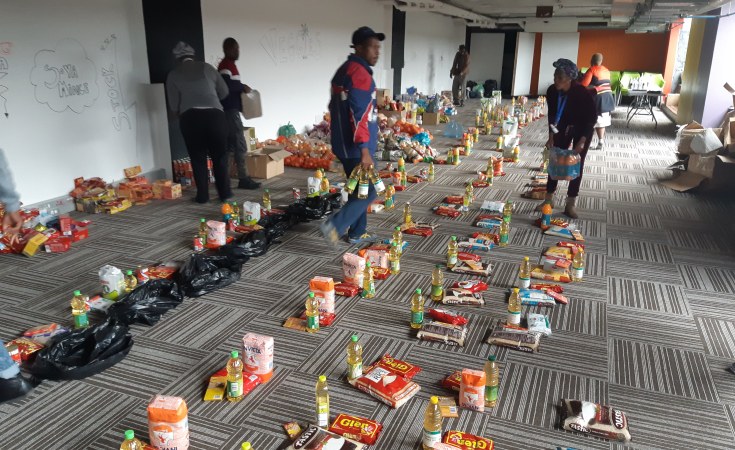Covid-19 has presented a severe danger for African societies and economies, as people faced the threat not only of the virus, but also of lockdown regulations that hit vulnerable communities hard. Many states have further used the emergency as a cover to clamp down on civic freedoms and repress the rights of excluded groups.
Fortunately, Africa's diverse and committed civil society has been on hand to play its part, mitigating the impacts of the crisis in a range of ways. Civil society organisations (CSOs) have been a key source of resilience, defending rights, helping those most in need, filling the gaps left by governments and businesses and holding their governments to account.
To respond to a pandemic that will have lasting impacts and be better prepared when the next crisis strikes, Africa's governments have some important lessons to learn. They need to view civil society in a different light, recognising the vital roles civil society played under the pandemic. States should partner with civil society and embrace not only its service-providing roles but also its more contentious watchdog and advocacy roles, because they are all important.
A new report released by the Johannesburg-based global civil society alliance, CIVICUS, 'Solidarity in the Time of COVID-19', highlights the irreplaceable roles played by civil society activists and organisations in all shapes and sizes during the pandemic.
Across Africa, civil society responded rapidly to provide food, essential services and vital sanitary items to communities left isolated by lockdowns and impoverished by economies placed on hold. Civil society stepped in when official communication channels failed to give people accurate information about how to protect themselves and their families from Covid-19. By using creative methods such as street art, and working in diverse languages, CSOs were able to disseminate important information to communities that governments were unable or unwilling to reach.
In country after country across the continent, civil society adopted a can-do mindset, mounting a positive response characterised by flexibility, creativity and innovation. Even CSOs that normally prioritise advocacy for rights rapidly reoriented to providing essential supplies and services.
In just a few of many examples, in Cameroon, where the government made mask use compulsory but did not provide masks, Crusaders for Environmental Protection and Ozone Watch, a CSO that usually campaigns on environmental issues, reoriented to distributing masks, producing sanitiser and installing buckets for hand washing. Many CSOs in the DR Congo did likewise.
Working with grassroots groups in Liberia, Youth Alliance for Rural Development organised a series of community workshops to create awareness of Covid-19 and how to avoid it; when donors came in later, they were surprised to find that people already had the knowledge they needed.
In South Africa, the Ndlovu Youth Choir worked to dispel myths and misunderstandings about Covid-19 and share basic health guidelines through their music.
Civil society devoted a large part of its response to helping at-risk and excluded groups adversely affected by lockdowns and emergency measures. Locked indoors, women faced greater risk of gender-based violence. Sexual minorities, migrants and refugees and ethnic or religious minority groups were often smeared as sources of infection and discriminated against when seeking help.
Civil society rose to the challenge, campaigning for policies to protect excluded groups and establishing remote services to help vulnerable communities.
Malawi's Centre for Social Concern and Development, for example, launched a mobile-to-mobile check-in service so that it could stay in contact with girls at risk of sexual violence when it was no longer possible to reach them physically.
In many countries, civil society also sought to hold police forces to account for human rights abuses committed while enforcing emergency regulations. In Nigeria, Spaces for Change set up an online tracking team to map and monitor restrictions, including police violence, and established a helpline to provide free legal advice to people whose rights were being violated.
But rather than recognising these vital civil society roles, too often African governments responded by imposing further restrictions. Whistleblowers were targeted: when journalist Hopewell Chin'ono exposed corruption in the procurement of medical supplies in Zimbabwe, his reward was arrest and detention.
Protests, even when masked and distanced, were often brutally policed. In one shocking example, at least six people were killed at a protest against emergency restrictions in Guinea in May.
It needn't be this way, and Africa also offers instances of good practices in partnership. In Somalia, for example, Action Against Hunger successfully partnered with the ministry of health to promote awareness about Covid-19, using social media and other communication channels to reach vulnerable and excluded groups.
Where governments partnered with civil society and created an enabling environment for its work, the response to the pandemic was much more effective. With Covid-19 still a pressing problem in so many countries, and with urgent debates pending on how post-pandemic reconstruction can lead to better and more just societies, partnering with civil society should not be a choice; it is a necessity.
Andrew Firmin is Editor-in-Chief and Inés Pousadela Senior Research Specialist at CIVICUS. 'Solidarity in the Time of COVID-19' is available to read and download here.


